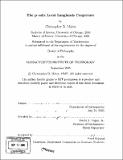The p-adic local langlands conjecture
Author(s)
Malon, Christopher D
DownloadFull printable version (2.028Mb)
Other Contributors
Massachusetts Institute of Technology. Dept. of Mathematics.
Advisor
David A. Vogan, Jr.
Terms of use
Metadata
Show full item recordAbstract
Let k be a p-adic field. Split reductive groups over k can be described up to k- isomorphism by a based root datum alone, but other groups, called rational forms of the split group, involve an action of the Galois group of k. The Galois action on the based root datum is shared by members of an inner class of k-groups, in which one k--isomorphism class is quasi-split. Other forms of the inner class can be called pure or impure, depending on the Galois action. Every form of an adjoint group is pure, but only the quasi-split forms of simply connected groups are pure. A p-adic Local Langlands correspondence would assign an L-packet, consisting of finitely many admissible representations of a p-adic group, to each Langlands parameter. To identify particular representations, data extending a Langlands parameter is needed to make "completed Langlands parameters." Data extending a Langlands parameter has been utilized by Lusztig and others to complete portions of a Langlands classification for pure forms of reductive p- adic groups, and in applications such as endoscopy and the trace formula, where an entire L-packet of representations contributes at once. (cont.) We consider a candidate for completed Langlands parameters to classify representations of arbitrary rational forms, and use it to extend a classification of certain supercuspidal representations by DeBacker and Reeder to include the impure forms.
Description
Thesis (Ph. D.)--Massachusetts Institute of Technology, Dept. of Mathematics, 2005. Includes bibliographical references (leaves 46-47).
Date issued
2005Department
Massachusetts Institute of Technology. Department of MathematicsPublisher
Massachusetts Institute of Technology
Keywords
Mathematics.